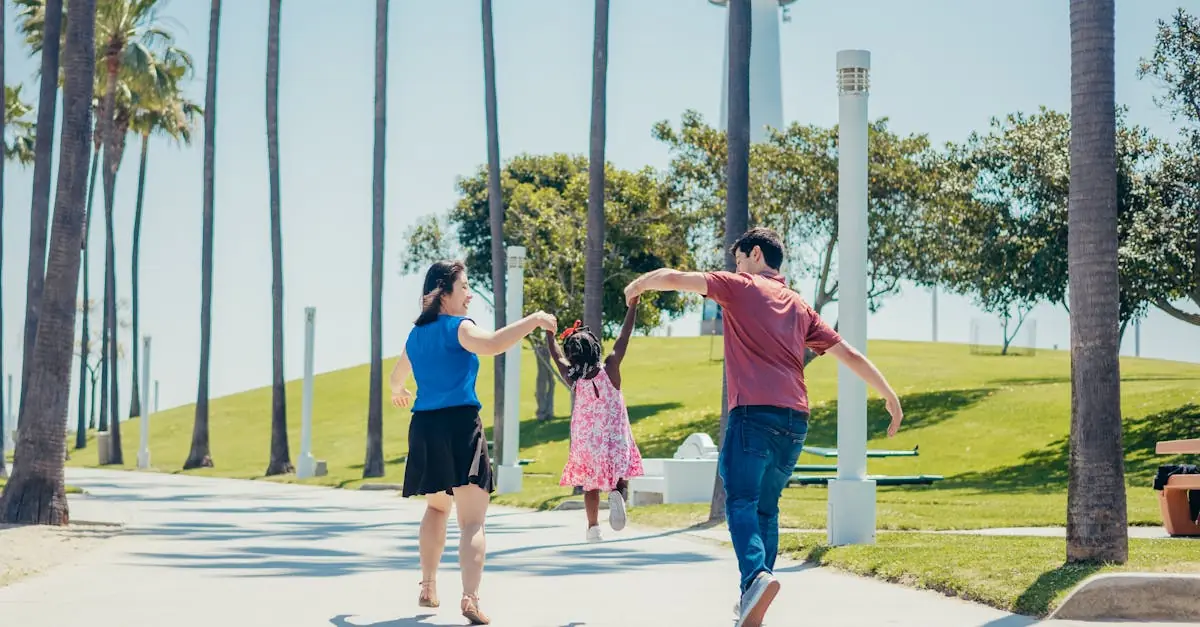Adopting from foster care is like finding the perfect pair of socks—sometimes it takes a little digging, but when you do, it’s a match made in heaven. Every year, thousands of children in foster care are waiting for a loving family to call their own. These kids come with stories, dreams, and a sprinkle of resilience that can warm even the coldest hearts.
Imagine transforming a child’s life while adding a little chaos and joy to your own. It’s not just about giving a home; it’s about creating memories, sharing laughter, and maybe even learning to tolerate the occasional crayon masterpiece on the wall. Adopting from foster care isn’t just a noble act—it’s an adventure filled with love, growth, and the chance to make a real difference. So buckle up and get ready for a heartwarming journey that could change everything.
Table of Contents
ToggleUnderstanding Foster Care Adoption
Foster care adoption offers a pathway to give children in need permanent, loving homes. It provides an opportunity to create lasting family bonds while helping children thrive.
What Is Foster Care?
Foster care serves as a temporary solution for children removed from their biological families due to various reasons, including neglect or abuse. Children live with certified households, called foster families, which provide support and stability during a challenging time. Each child in foster care has unique circumstances, and many wait for adoption into a forever family. Laws and regulations govern the foster care system to ensure children’s safety and well-being.
The Process of Foster Care Adoption
The process of adopting from foster care begins with home study assessments that evaluate potential adoptive parents. Agencies provide training programs to prepare families for the responsibilities of adoption. After these steps, families can be matched with a child who fits their profile. Adoption finalization includes legal paperwork to formalize the new family arrangement. Post-adoption support helps families navigate challenges that arise after bringing a child home, ensuring a smoother transition.
Benefits of Adopting From Foster Care
Adopting from foster care offers significant advantages for both children and families. This path to adoption not only changes lives but also strengthens communities.
Providing a Stable Home
Creating a stable home environment becomes a reality for children through foster care adoption. Consistency in daily routines nurtures a sense of security, which is crucial for children who have faced upheaval. Families can offer emotional support that helps children build resilience. Adjustments to foster children’s emotional needs become manageable within stable settings. Positive family interactions foster trust, allowing children to heal and thrive. As children settle into their new homes, the transformation and growth they experience are often heartwarming.
The Impact on Children’s Lives
Transforming children’s lives happens when families choose to adopt from foster care. A loving home offers not just stability but also opportunities for personal development and education. Children gain new chances to form healthy relationships, which aid in social skill development. Many who experience adoption show improvement in emotional well-being. The support from adoptive families often leads to greater confidence and self-esteem, factors essential for success in life. Connections formed in these families create lasting bonds that significantly enhance children’s overall quality of life.
Challenges in Adopting From Foster Care
Adopting from foster care carries challenges alongside its rewards. Many families encounter emotional and behavioral concerns when integrating a child into their home.
Emotional and Behavioral Concerns
Children from foster care often display emotional and behavioral issues due to past trauma. They may struggle with trust, attachment, and self-regulation. Previous experiences of neglect or abuse contribute to these challenges. Adoption can trigger feelings of abandonment or anxiety. Families may witness difficulty in forming connections or establishing routines. Careful patience and understanding play key roles in helping these children adapt. Utilizing therapy and counseling services can support emotional healing. Strategies for managing behavior, combined with a nurturing environment, lead to positive outcomes for children during this transition.
Legal and Bureaucratic Hurdles
Navigating legal requirements poses another significant challenge. The adoption process involves complex paperwork and various regulations. Families must complete home studies and background checks before placement. Expect delays in processing due to court schedules and current case loads. Understanding the legal framework surrounding foster care adoption can prove daunting. Adoptive parents might encounter different requirements depending on their state. Seeking guidance from adoption agencies or legal professionals eases the process. Familiarity with the steps involved helps in overcoming bureaucratic obstacles efficiently.
How to Prepare for Adoption
Preparing for adoption from foster care requires careful planning and consideration. Families begin by understanding the complexities of the process and their own emotional readiness.
Research and Resources
Gathering information about the foster care system is crucial. Parents can access resources from agencies like the U.S. Children’s Bureau, which provides guidelines on adoption procedures. Local agencies often offer educational seminars, books, and online resources to aid in understanding adoption dynamics. Collaborating with experienced adoptive families offers valuable insights into their journey. Utilizing community support groups fosters connections with other adopters, creating an encouraging environment. Exploring local libraries also reveals numerous books focused on adoption’s emotional and legal aspects. Through thorough research, families build a strong foundation for the adoption journey.
Training and Support for Adoptive Parents
Engaging in training programs prepares families for the unique challenges of adopting from foster care. Many states mandate pre-adoption training covering trauma-informed care, parenting strategies, and behavioral management. Participating in workshops equips parents with valuable tools to support their children effectively. Organizations like the National Adoption Center provide resources and training opportunities tailored to adoptive parents. Ongoing support after adoption plays a critical role in ensuring family stability. Connecting with post-adoption services offers counseling, support groups, and workshops tailored to adoptive families’ needs. Through comprehensive training and support, parents develop the skills necessary to nurture and empower their children.
Conclusion
Adopting from foster care is a journey filled with potential and love. It offers children a chance to heal and thrive in a nurturing environment while allowing families to grow and create lasting bonds. The emotional rewards of this experience far outweigh the challenges, as both children and parents embark on a path of discovery and resilience.
With the right preparation and support, families can navigate the complexities of the adoption process and build a stable, loving home. Embracing this adventure not only transforms lives but also enriches the community as a whole. Choosing to adopt from foster care is a powerful decision that can lead to a brighter future for everyone involved.




